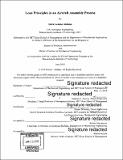| dc.contributor.advisor | Stephen C. Graves and Daniel Whitney. | en_US |
| dc.contributor.author | Aldama, Dora Leanne | en_US |
| dc.contributor.other | Leaders for Global Operations Program. | en_US |
| dc.date.accessioned | 2018-10-22T18:46:59Z | |
| dc.date.available | 2018-10-22T18:46:59Z | |
| dc.date.copyright | 2018 | en_US |
| dc.date.issued | 2018 | en_US |
| dc.identifier.uri | http://hdl.handle.net/1721.1/118735 | |
| dc.description | Thesis: S.M., Massachusetts Institute of Technology, Department of Mechanical Engineering, 2018. | en_US |
| dc.description | Thesis: M.B.A., Massachusetts Institute of Technology, Sloan School of Management, in conjunction with the Leaders for Global Operations Program at MIT, 2018. | en_US |
| dc.description | Cataloged from PDF version of thesis. | en_US |
| dc.description | Includes bibliographical references (page 71). | en_US |
| dc.description.abstract | A universal imperative of most manufacturing firms is to lower cost, increase production rate, and deliver exceptional quality for every product. The manufacturing firm that springs to mind as the standard bearer for all three is Toyota and the generalized lean manufacturing method known as the Toyota Production System. The literature on what lean manufacturing is and how to do it is vast. This thesis first contributes to that cache of lean literature an example of one aerospace company's interpretation of lean and how it is defined in assembly production design. In other words, this thesis tests the claim that lean principles can be incorporated in the design of an aircraft assembly process to achieve the lean goals of producing a perfect product with zero waste at the rate at which a customer demands it. The thesis covers a seven-month research period at an aircraft assembly factory and is broken into three phases. The first phase presents research on an existing lean transformation initiative in the factory and measures its success at achieving lean goals. This evaluation determines that the as-designed system does meet the goals of lean to continuously improve and eliminate waste but also exposes problems to other sub-systems in the factory. Phase I identified several improvement candidates for deeper study, and the rest of the thesis considers one of these opportunities, specifically on the material delivery system. The second part of the thesis focuses on a root cause analysis of the problems associated with the material delivery system at meeting lean goals. The resulting question is what changes to the material delivery system are required to further these goals. The company was already considering several solutions to answer this question; however, the proposed solutions would violate the original design requirements for the system. This hindered the ability to make improvements. The third part of this thesis examines the redefinition of the design requirements that embody lean principles as well as other requirements imposed on the system. This allows for new solutions to be evaluated against the design requirements and a final recommendation is proposed. | en_US |
| dc.description.statementofresponsibility | by Dora Leanne Aldama. | en_US |
| dc.format.extent | 71 pages | en_US |
| dc.language.iso | eng | en_US |
| dc.publisher | Massachusetts Institute of Technology | en_US |
| dc.rights | MIT theses are protected by copyright. They may be viewed, downloaded, or printed from this source but further reproduction or distribution in any format is prohibited without written permission. | en_US |
| dc.rights.uri | http://dspace.mit.edu/handle/1721.1/7582 | en_US |
| dc.subject | Mechanical Engineering. | en_US |
| dc.subject | Sloan School of Management. | en_US |
| dc.subject | Leaders for Global Operations Program. | en_US |
| dc.title | Lean principles in an aircraft assembly process | en_US |
| dc.type | Thesis | en_US |
| dc.description.degree | S.M. | en_US |
| dc.description.degree | M.B.A. | en_US |
| dc.contributor.department | Leaders for Global Operations Program at MIT | en_US |
| dc.contributor.department | Massachusetts Institute of Technology. Department of Mechanical Engineering | |
| dc.contributor.department | Sloan School of Management | |
| dc.identifier.oclc | 1057269470 | en_US |
